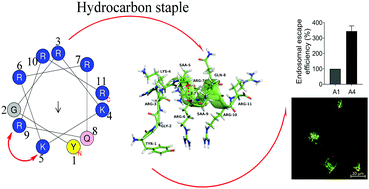Hydrocarbon staple constructing highly efficient α-helix cell-penetrating peptides for intracellular cargo delivery†
Abstract
The effects of all-hydrocarbon cross-linking on the cell-penetrating properties of Tat were systematically investigated. These stapled cell-penetrating peptides were designed to exhibit a cationic secondary amphipathic profile. We found that the hydrophobicity and helical conformation of these hydrocarbon staple peptides correlate well with their cellular uptake efficiency. Our results also revealed that higher affinity to heparan sulfate of the rigid stapled Tat peptides correlated well with the higher cellular uptake compared with non-stapled Tat peptides with flexible charge display. Notably, the stapled Tat peptides showed increased endosomal escape, high proteolytic stability, and low cytotoxicity. Therefore, they present a potent system for the intracellular transport of bioactive cargos.



 Please wait while we load your content...
Please wait while we load your content...